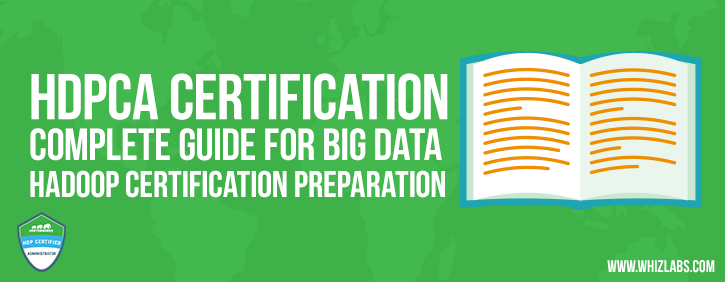Technology has changed its landscape. Everything you may hear today is revolving around some big terms like big data, cloud, AI, data science, etc. To put it in another way IT professionals are following the trajectory of these booming technologies.
Big Data is something that has taken a high momentum in last two years. And when we talk about big data, Hadoop is the ultimate term that comes to mind. No other big data processing tool has gained such market popularity than this open source tool from Apache.
However, Hadoop is a growing field with continuous upgradation and added features as well as members in its ecosystem. Hence, it is, of course, a challenging question how to start learning Hadoop for beginners and what to cover?
In this blog, we will try to familiarise you with a roadmap of learning Hadoop as a beginner. Just get ready to find the best way to learn Hadoop.
Enroll Now: Hadoop Basics Online Training Course
Have a Quick View of Market Data Before You Start Learning Hadoop
Before we start learning Hadoop for beginners in detail, ask yourself why do you want to learn Hadoop? Is it just because others are running on this track? Will it be helpful in the long run? So, why not to look at the market statistics to evaluate its value. Well, here is a rough statistics on Hadoop possibilities.
91% of market leaders rely on customer data to take a business decision. Moreover, they believe that these data are the key driver of success in business. With the changed marketing strategy, there is a surge in data generation in all sectors which is estimated almost 90% in last two years.
The big data market is going to expand worth USD 46 billion by the end of 2018. The annual growth of this will be approximately 23% by the end of 2019. There is a considerable gap between the ongoing demand for right skilled big data resource and supply.
Hence, there is an ongoing job opportunity in big data domain for Hadoop professionals indeed.
Note: If you are preparing for a Hadoop interview, we recommend you to go through the top Hadoop interview questions and get ready for the interview.
Some Helpful Skill Sets for Learning Hadoop for Beginners
Though it is not mandatory, however, if you should have the working knowledge of the following technologies to grasp Hadoop fast. However, if you are unfamiliar with it, learning is the solution for them. Take help from books, online materials, experienced people or simply join a course to get hold of them and move forward!
Now let’s have a look at the necessary technical skills for learning Hadoop for beginners.
Linux Operating System
Linux as the operating system and Ubuntu as server distribution is the preferred choice for Hadoop installation. So, basic working knowledge of Linux like commands, the editor works like wonder and makes your life easier during Hadoop installation and file management.
However, if you are a novice on it, you can grab an Ubuntu image and can learn the features by installing it in a virtual box.
Programming Skills
Hadoop is not restricted to any particular job role and handles different languages depending on that. For example, a data analyst may need to know R or Python, whereas a Hadoop developer must know Java or Scala. Overall Hadoop is related to a programming language.
Hence, with prior knowledge of any programming language, learning Hadoop for beginners becomes easier. Again, that doesn’t mean Hadoop is not for a non-programmer. Many skilled Java professionals also learn R/Python from scratch. Furthermore, with more and more demand of Hadoop in the market, training or learning these languages are not a tough job today.
SQL Knowledge
This is one area which you must focus irrespective of your future role in Hadoop jobs. Hadoop is all about handling and processing data. Hence, knowledge of SQL query and commands are must to learn Apache Hadoop.
Furthermore, the Hadoop ecosystem has many software packages like Apache Hive, HBase, and Pig, etc. that extracts data from HDFS using SQL like queries. So, if you are not hands-on with SQL query at all, practice it using MySQL workbench or other tools.
While learning Hadoop, it is important to understand various Hadoop terms. Let’s begin with these top 20 Hadoop terms!
Understand the Basics – The Stepping Stone to Learn Apache Hadoop
Step 1: Know the purpose of learning Hadoop
Before you proceed to learn Hadoop as a beginner, stop for a while and think why Hadoop is so popular and its usability in the technology market. This will help you to understand the core idea behind Hadoop’s functionalities. To achieve this
- Watch webinars
- Follow documentation available on the internet
- Read Case studies and white papers
Step 2: Identify Hadoop components
Get yourself acquainted with the underlying architecture of Hadoop. To do that try to understand how the components like HDFS, MapReduce and Yarn works in the architecture. Once you get the picture of this architecture, then focus on overall Hadoop ecosystem which typically means knowing different tools that work with Hadoop.
The best way to move is installing Hadoop and doing hands-on practice to know more about its practical aspects.
Step 3: Theory – A must to do
Without knowing the theory, you cannot move more. Hence, following good books, articles and case studies are essential to grab the knowledge properly. There are a lot of good books available in the market that can help you at all stages. Books like Hadoop – the Definitive Guide works like the bible of Hadoop for the beginners.
Want to read some more Hadoop books? Here are the Best Books for HortonWorks Certification with detailed information about the books.
The Best Way to Learn Hadoop for Beginners
Once you’re familiarised with the basics of the Hadoop, you are ready to move to the next levels to learn Hadoop. Let’s follow the best path of learning Hadoop for beginners.
Step 1: Get your hands dirty
Practice makes a man perfect. The more you practice hands-on with Hadoop, the more you get insights on it. Beginners can download and set up a virtual machine provided by Hortonworks or Cloudera – the two major vendors of the Hadoop industry. The alternate way is to access a pre-installed set up of VM from any training source. Both the way you can access and practice Hadoop and make your Hadoop learning process faster and effective.
Step 2: Become a blog follower
Following blogs help one to gain a better understanding than just with the bookish knowledge. There are a good number of big data blogs for beginners available online to provide you a perception of the trends and innovation happening in the field.
Looking for some Big Data blogs to follow? Here is the Best of 2018: A Complete List of Big Data Blogs.
Step 3: Join a course
Joining a guided course always helps well and makes learning Hadoop easier for beginners. There are many classrooms and online training facilities available in the market for learning Hadoop for beginners. Moreover, these courses come with additional packages and tools to learn the Hadoop ecosystem.
Step 4: Follow a certification path
Ultimately, your goal of learning Hadoop as a beginner is to get a place in the Hadoop industry. If you are in the same line why you don’t follow a certification roadmap? No doubt, a certification from Hortonworks or Cloudera will distinguish you from others with the same skill without any question.
Are you confused between Cloudera and Hortonworks? Let’s find out whether Cloudera or Hortonworks better for Hadoop certification?
Bottom Line
To conclude, learning any technology is a journey, not a destination. Hence, you should have persistence and motivation to walk in this challenging world of technology.
At Whizlabs, we always help professionals to stay up to date with market trends and technologies. Hence, as part of your learning Hadoop journey, if you want to avail guided course, here are the available course guides which follow industry-leading certification roadmaps-
Hortonworks Spark Developer Certification (HDPCD)
Hadoop Administrator Certification (HDPCA)
Cloudera Certified Associate Administrator (CCA 131)
Join us and start your journey of learning Hadoop for beginners!
- Top 45 Fresher Java Interview Questions - March 9, 2023
- 25 Free Practice Questions – GCP Certified Professional Cloud Architect - December 3, 2021
- 30 Free Questions – Google Cloud Certified Digital Leader Certification Exam - November 24, 2021
- 4 Types of Google Cloud Support Options for You - November 23, 2021
- APACHE STORM (2.2.0) – A Complete Guide - November 22, 2021
- Data Mining Vs Big Data – Find out the Best Differences - November 18, 2021
- Understanding MapReduce in Hadoop – Know how to get started - November 15, 2021
- What is Data Visualization? - October 22, 2021



Thank you for your post. This is excellent information. It is amazing and wonderful to visit your site.
Great presentation of Hadoop form of blog and Hadoop tutorial. Very helpful for beginners like us to understand Hadoop course.
Good information for those who are looking for how to start and what to do.
Thank you…
Good information Thanks for sharing
There exists a free Desktop application Hadjo that let’s you create and manage a cluster of nodes. One can create and manage a whole cluster on his own PC, laptop or Mac with just a few mouse clicks.
It has some handy features that are very helpful for beginners of the Hadoop world:
Quickly create master and slave nodes for Hadoop 2.8, 2.9, 3.0 and 3.1;
Quick access to master and slave HDFS snd Yarn service logs by just mouse clicking;
Simulate a server crash and see how the cluster behaves;
Modify Hadoop configurations and re-create cluster with just a few mouse clicks;
Handy access to the localhost Web UI of HDFS and ResourceManager
Creates a Docker image. The Hadoop nodes run on top of Docker. No prior knowledge of Docker is required to operate with Hadjo as the latter hides the complexities of Docker container management
I hope that helps on your journey to Hadoop
This is excellent information thank you for sharing
good article….
Thank you for the effort on this blog
This is one of the comprehensive Hadoop for Beginners Py Article I have read. Glad that I choose your first over others.
Thanks very much and I really hope learn more from you go-to expert
Hi… These blogs offer a lot of information . Your blog is incredible. I am delighted with it. Thank you for sharing this wonderful post.
Really getting inspired by reading this article !!
Kudos to the creator of this blog !!
Thanks for your usefull advices.
Hi… These blogs offer a lot of information. Your blog is incredible. I am delighted with it. Thank you for sharing this wonderful post.
Your place is valueble for me. Thanks!…